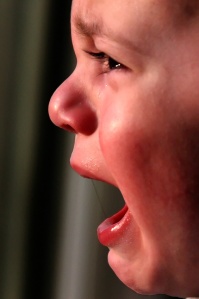On the morning of the third day there was thunder and lightning. A cloud covered the mountain, and a very loud horn sounded. All the people among the tents shook with fear. Then Moses brought the people from among the tents to meet God. They stood at the base of the mountain. Mount Sinai was all in smoke because the Lord came down upon it in fire. Its smoke went up like the smoke of a stove. And the whole mountain shook. The sound of the horn became louder and louder. Moses spoke, and God answered him with thunder. Then the Lord came down upon Mount Sinai, to the top of the mountain. The Lord called Moses to the top of the mountain, and he went up. Then the Lord said to Moses, “Go down and tell the people not to break through to look at the Lord. For then many of them would be destroyed. Have the religious leaders who come near to the Lord set themselves apart to be holy. Or the Lord will go against them.” Moses said to the Lord, “The people cannot come up to Mount Sinai. For You told us, ‘Set places around the mountain that must not be passed, and set it apart as holy.’” Then the Lord said to him, “Go down, and then come up with Aaron. But do not let the religious leaders and the people break through to come up to the Lord, or He will go against them.” So Moses went down to the people and told them. Ex 19:16-25
 It's no wonder the Bible often refers to the Hebrews as the "Children of Israel."
It's no wonder the Bible often refers to the Hebrews as the "Children of Israel."
Indeed, they were much like infants when they first came out of Egypt following 400 years of slavery. They had to relearn how to live as free men and women. They also had to learn how to grow up spiritually. That's what makes their wilderness journey such a powerful model for anyone going through a healing process from life's hurts or abuses.
During the first few months of their freedom, God worked almost exclusively on teaching them to trust him through his presence, provision and protection. He didn't punish them for their groaning, moaning or complaining. They were no different than hungry infants squalling because they didn't know any other way to let their needs be known.
But at Mt. Sinai, things were about to change. Lesson two had to do with obedience - establishing boundaries and understanding the consequences of their actions. They had seen the power of God. Now they needed to learn to respect him and his power - to learn to obey him, in order to grow in their relationship with him.
We've all stood in line at the grocery store and watched toddlers testing their boundaries while a harried parent tries to keep them out of trouble. While we can understand and overlook the behavior of a two year old throwing a tantrum in the middle of Wal-Mart, it's not so amusing when the child is twelve!
God didn't want a nation of twelve-year-old tantrum-throwers so it was time to move forward in their healing process. He drew a boundary around the mountain and instructed the people through Moses that they were not to cross it. The Israelites weren't mature enough spiritually to come close to God because of his holiness. His holy presence would be like a mirror, reflecting back their sin, faults and failures, even to the point of causing physical death if they came too close.
The boundaries were established for their protection and personal safety, but also to help them define themselves and God more clearly. They needed to get a clearer picture of who they were in relationship with God. As time progressed, these elementary lessons would help them learn who they were in relationship with others, to prevent all the childish bickering that had started to erupt among them.
In some ways the experience here at Mt Sinai, was an advanced lesson in trust, helping them understand that their God wouldn't swallow them up or control them. He had offered them true freedom of will and choice - but their choices would have consequences.
Can you remember a time where God set boundaries for you? It might have been a time when he confronted you with something sinful or lacking in your life? These times remind us of who he is and how naked or vulnerable we are in his presence. They help define us as finite and faulty in the presence of the perfect and righteous God of the universe. They also help us choose to obey his will.
The beauty of these confrontations is that God always offers us a way through Christ to cross those lines into his presence through obedience, repentance and trust. 1 John 1:9 says, "If we confess our sins, he is faithful and just to forgive our sins and to cleanse us from all unrighteousness."
Obedience to God's boundaries is an important key to growing up spiritually; to avoid becoming a twelve-year-old tantrum-thrower and to move forward in our healing process.
 It's no wonder the Bible often refers to the Hebrews as the "Children of Israel."
It's no wonder the Bible often refers to the Hebrews as the "Children of Israel." Indeed, they were much like infants when they first came out of Egypt following 400 years of slavery. They had to relearn how to live as free men and women. They also had to learn how to grow up spiritually. That's what makes their wilderness journey such a powerful model for anyone going through a healing process from life's hurts or abuses.
During the first few months of their freedom, God worked almost exclusively on teaching them to trust him through his presence, provision and protection. He didn't punish them for their groaning, moaning or complaining. They were no different than hungry infants squalling because they didn't know any other way to let their needs be known.
But at Mt. Sinai, things were about to change. Lesson two had to do with obedience - establishing boundaries and understanding the consequences of their actions. They had seen the power of God. Now they needed to learn to respect him and his power - to learn to obey him, in order to grow in their relationship with him.
We've all stood in line at the grocery store and watched toddlers testing their boundaries while a harried parent tries to keep them out of trouble. While we can understand and overlook the behavior of a two year old throwing a tantrum in the middle of Wal-Mart, it's not so amusing when the child is twelve!
God didn't want a nation of twelve-year-old tantrum-throwers so it was time to move forward in their healing process. He drew a boundary around the mountain and instructed the people through Moses that they were not to cross it. The Israelites weren't mature enough spiritually to come close to God because of his holiness. His holy presence would be like a mirror, reflecting back their sin, faults and failures, even to the point of causing physical death if they came too close.
The boundaries were established for their protection and personal safety, but also to help them define themselves and God more clearly. They needed to get a clearer picture of who they were in relationship with God. As time progressed, these elementary lessons would help them learn who they were in relationship with others, to prevent all the childish bickering that had started to erupt among them.
In some ways the experience here at Mt Sinai, was an advanced lesson in trust, helping them understand that their God wouldn't swallow them up or control them. He had offered them true freedom of will and choice - but their choices would have consequences.
Can you remember a time where God set boundaries for you? It might have been a time when he confronted you with something sinful or lacking in your life? These times remind us of who he is and how naked or vulnerable we are in his presence. They help define us as finite and faulty in the presence of the perfect and righteous God of the universe. They also help us choose to obey his will.
The beauty of these confrontations is that God always offers us a way through Christ to cross those lines into his presence through obedience, repentance and trust. 1 John 1:9 says, "If we confess our sins, he is faithful and just to forgive our sins and to cleanse us from all unrighteousness."
Obedience to God's boundaries is an important key to growing up spiritually; to avoid becoming a twelve-year-old tantrum-thrower and to move forward in our healing process.


